新概念英语第一册学习手册【Lesson91、93、95】
(完整版)新概念第一册Lesson91-92
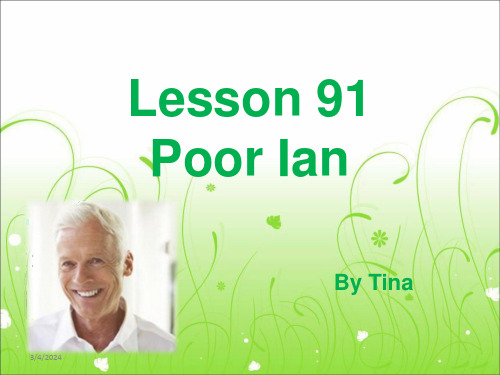
come to work→work等
• 现在完成时可表示持续到现在的动作或 状态,动词一般是延续性的,如
• live, teach, learn, work, study, know.
• 过去时常用的非持续性动词有: • come, go, leave, start, die, finish,
become, get married.
特疑词+ have (has)+主语+p.p?
(2) 表示动作发生在过去某个不确定的时间, 但对现在留下了某种影响和结果。 常被just、already、yet 等副词修饰。
-Have you had lunch yet? 你(已经)吃午饭了吗? -Yes, I have. I‘ve just had it. 我刚刚吃过。(现在我不饿了)
(强调动作,过程)
move out (of) 搬出来
move away
搬走
move from…to…
从…搬到…
②感动,打动
This story moved me. 这个故事感动了我。 The news moved him very much. 这消息使他很感动。
Байду номын сангаас
★ miss [mis] v. 想念,思念
★ person ['pə:sən] n. 人
He is a nice/good person. 他是个好人。 in person 亲自,直接的 He will go to get the money in person. 他将亲自去取钱。
★ personal adj. 个人的,私人的
['pə:sənəl]
• The patient is lying still. • 病人安静地躺着。
新概念英语第一册91-92课笔记

新概念英语第一册91-92课笔记-CAL-FENGHAI.-(YICAI)-Company One1Lesson 91 Poor Ian![课文]CATHERING: Has Ian sold his house yet?JENNY: Yes, he has. He sold it last week.CATHERING: Has he moved to his new house yet?JENNY: No, not yet. He's still here.He's going to move tomorrow.CATHERING: WhenTomorrow morning.JENNY: No. Tomorrow afternoon. I'll miss him.He has always been a good neighbour.LIDA: He's a very nice person.We'll all miss him.CATHERING: When will the new people move into this house?JENNY: I think that they'll move in the day after tomorrow.LINDA: Will you see Ian today, Jenny?JENNY: Yes, I will.LINDA: Please give him my regards.CATHERING: Poor Ian!He didn't want to leave this house.JENNY: No, he didn't want to leave, but his wife didstill [stil] ad.还,仍旧move [mu:v] v.搬家miss [mis] v.想念,思念neighbour ['neibə] n.邻居person ['pə:sn] n.人people ['pi:pl] n.人们poor [puə] a.可怜的★still adv. 还,仍旧① adv. 还是,仍然I still can’t decide where to go. 我还是不能决定去哪儿。
新概念英语第1册第91-92课课重点语法

新概念英语第1册第91-92课课重点语法第91-92课的内容:一、重要句型或语法1、一般将来时表示将来会发生的动作或状态,形式为will do,如:He will come here tomorrow./ They will be in Shanghai next week.二、课文主要语言点Has Ian sold his house yet? Yes, he has. 1)可简单复习一下现在完成时的内容。
2)注意人名Ian的发音He sold it last week. 1)可提问学生为什么此处动词要用一般过去时。
2)注意sell的过去式和过去分词都是sold。
Has he moved to his new house yet? No, not yet. 1)注意对比本句中的move to(搬到)和下文中的move into(搬进,要接宾语)和move in(搬进,不接宾语)的区别。
2)not yet,还没有。
He's still here. He's going to move tomorrow. 可复习be going to do的用法,同时对比与will do的区别:be going to do侧重表达主观打算或意愿。
When? Tomorrow morning? No. Tomorrow afternoon. 两个问句都采用了简略形式,因为口语中往往无需重复上文已经明确的信息,回答也采用简略形式。
完成问句应该是:When is he going to move? Is he going to move tomorrow morning?I'll miss him. 注意提醒will do的缩略形式:'ll do。
He has always been a good neighbour. 本句话可以作为常用句型识记运用:sb. has always been a good ...。
新概念第一册Lesson_91-92

person强调单数“一个人”
people 强调复数“许多人,人们”,为集合名 词。
精选ppt
33
He has always been a good neighbour. 现在完成时 指Ian自从在这住开始到现在一直都很好
Grammar - 一般将来时
否定句:
eg. He will not (won't) come back next week.
他下周回不来。
eg. She will not (won't) go to visit her friend this afternoon.
她今天下午不会去拜访她的朋友。
精选ppt
清辅 [p] 音
10
对 浊辅 []
辅
音
音
3个鼻音
[t] [k] [f] [s] [∫] [t∫] [tr] [θ] [ t s ]
[d] [g] [v] [z] [3] [d3] [dr] [ð] [ d z ]
[m] [n] [η]
3个似拼音
[h] [r] [l]
2个半元音
精选ppt
[w] [j]
eg. He is a good person. 他是个好人。 There are a lot of people
in the street. 街上有很多人。
person单数,people是复数(不加S)
精选ppt
14
poor adj. 可怜的
1)可怜的, eg. The poor old woman had no one to talk to.
新概念一册lesson91-100课课练与参考答案
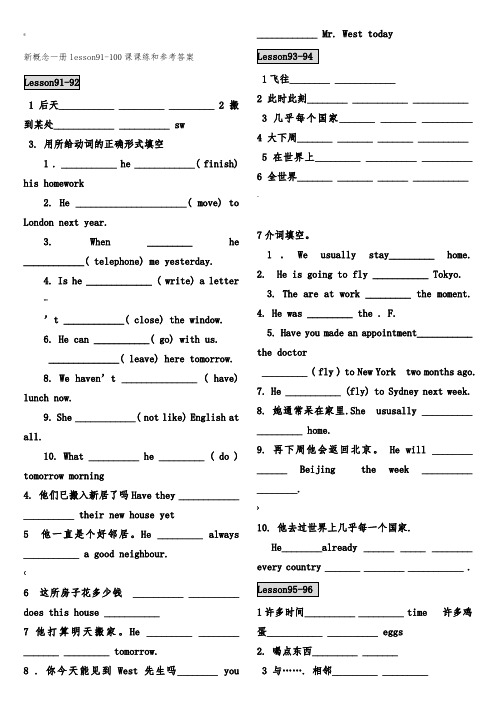
@新概念一册lesson91-100课课练和参考答案1 后天___________ _________ _________2 搬到某处____________ __________ sw3. 用所给动词的正确形式填空1 . ___________ he ____________( finish) his homework2. He ______________________( move) to London next year.3. When _________ he ____________( telephone) me yesterday.4. Is he _____________ ( write) a letter…’t ____________( close) the window.6. He can ___________( go) with us.______________( leave) here tomorrow.8. We haven’t _______________ ( have) lunch now.9. She ____________( not like) English at all.10. What __________ he _________ ( do ) tomorrow morning4. 他们已搬入新居了吗Have they ____________ __________ their new house yet5 他一直是个好邻居。
He _________ always ___________ a good neighbour.(6 这所房子花多少钱__________ __________ does this house ___________7 他打算明天搬家。
He _________ ________ _______ _________ tomorrow.8 . 你今天能见到West先生吗________ you ____________ Mr. West today1飞往________ ____________2 此时此刻________ ___________ ___________3 几乎每个国家_______ _______ __________4 大下周_______ _______ _______ __________5 在世界上_________ __________ __________6 全世界_______ _______ ______ ___________~7介词填空。
新概念英语第一册91-92课笔记.doc
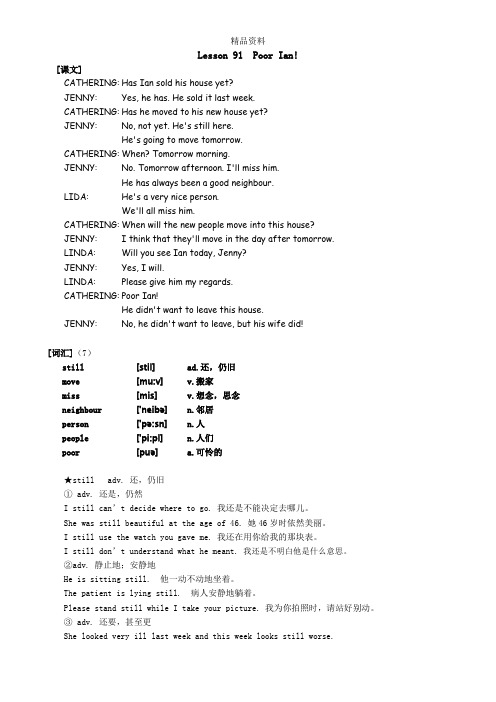
Lesson 91 Poor Ian![课文]CATHERING: Has Ian sold his house yet?JENNY: Yes, he has. He sold it last week.CATHERING: Has he moved to his new house yet?JENNY: No, not yet. He's still here.He's going to move tomorrow.CATHERING: When? Tomorrow morning.JENNY: No. Tomorrow afternoon. I'll miss him.He has always been a good neighbour.LIDA: He's a very nice person.We'll all miss him.CATHERING: When will the new people move into this house?JENNY: I think that they'll move in the day after tomorrow.LINDA: Will you see Ian today, Jenny?JENNY: Yes, I will.LINDA: Please give him my regards.CATHERING: Poor Ian!He didn't want to leave this house.JENNY: No, he didn't want to leave, but his wife didstill [stil]ad.还,仍旧move [mu:v]v.搬家miss [mis]v.想念,思念neighbour ['neibə] n.邻居person ['pə:sn] n.人people ['pi:pl] n.人们poor [puə] a.可怜的★still adv. 还,仍旧① adv. 还是,仍然I still can’t decide where to go. 我还是不能决定去哪儿。
新概念英语第一册91-92课
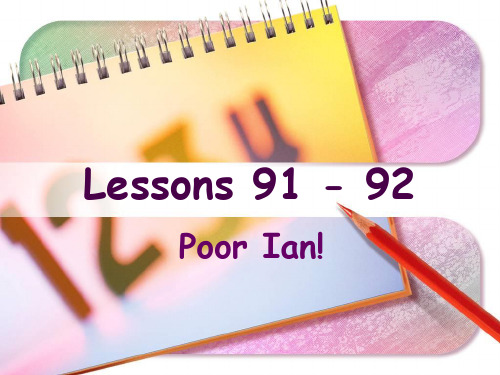
Poor Ian!
New words and expressions
still adv. move v. miss v. neighbour n. person n. people n. poor adj.
还,仍旧 搬家 想念,思念 邻居 人 人们 可怜的
引导宾语从句的关联词有从属连词,疑问代词, 疑问副词,缩合连接代词,缩合连接副词等。
Grammar--宾语从句
I am afraid that you can't see him today. 我恐怕你今天见不到他。 (关联词是从属连词that)
在非正式文体中关联词that常被省去。 eg:I hope you can come tomorrow. 我希望你明天能够来。 (that省略)
JENNY:
No, not yet. He's still here. He's
going to move tomorrow.
move to 搬家到... eg:All her family have moved to the US.
她全家人都已经搬到美国去住了。
完整的回答: He hasn't moved to his new house
1)一般将来时表示将来某一时刻的动作、状态以 及打算。该时态一般与表示将来意义的时间状语 连用。
tomorrow this month the day after tomorrow next week in two days' time from now on in the future
Grammar--宾语从句
用作宾语的从句叫做宾语从句,即充当宾语成份 的不是一个单词或词组,而是一个句子。
新概念课堂笔记第一册Lesson91-92

新概念英语课堂笔记第一册Lesson 91-92Word Studystill【用法】adv. 还,仍旧;还要,甚至更;静止地adj. 静止的,不动的;寂静的【例句】I still don’t understand what he meant. 我还是不明白他是什么意思。
She was still beautiful at the age of 46. 她46岁时依然美丽。
It was hot yesterday, but it’s still hotter today. 昨天很热,然而今天甚至还要热些。
She looked very ill last week and this week looks still worse. 上星期她看上去病的很厉害,而这个星期看来更不行了。
He is sitting still. 他一动不动地坐着。
The patient is lying still. 病人安静地躺着。
The doctor asked me to keep still. 医生叫我不要动。
How still everything is! 一切是多么寂静啊!The night was very still. 那天晚上很宁静。
move【用法】v. 搬家;搬动,移动;使感动【词组】move to 搬到……move sth. away 搬开;移走move on 朝前走;继续移动move about 走来走去move in 迁入move out 迁出【扩展】movement n. 移动;搬动;运动;活动movable adj. 可移动的moved adj. 感动的moving adj. 令人感动的,感人的【例句】The Smiths are going to move to New York. 史密斯一家打算搬到纽约去。
They moved into the new house last month. 他们上个月搬进了新家。
新概念英语第一册lesson91-92学习资料

Grammar
一般将来时 (the future tense)
1.一般将来时表示在将来某一时间将要发生 的动作或存在的状态,也可表示将来某一 段时间内经常发生的动作或存在的状态。
2.结构: Shall (第一人称I we ) /will+动词原形
be going to +动词原形
与一般将来时连用的时间状语
adv. 还,仍旧 v. 搬家 v. 想念,思念 n. 邻居 n. 人 n. 人们 adj. 可怜的
already用于陈述句和肯定句句中
A :Has Ian sold his house yet? yet用于疑问句和否定句的句尾。
B: Yes, he has. He sold it last week. A: Has he moved to his new house yet?
按照中文习惯去赞同别人的说法,而是要根据 事实来说,因此回答no, he didn’t want to leave. 但是翻译成中文的时候要说,是的,他 不愿意离开。 反意疑问句,前肯后否,前否后肯。 例句: He didn’t go to school last week, did he?
No, he didn’t. 是的,他没去。 Yes, he did. 不,他去了的。
B: No, not yet. He’s still here. He’s going to move tomorrow.
A: When? Tomorrow morning?
B: No. Tomorrow afternoon. I’ll miss him. He has always been a good neighbour .
A:I think that they will move in the day after
(完整版)新概念第一册Lesson91-92
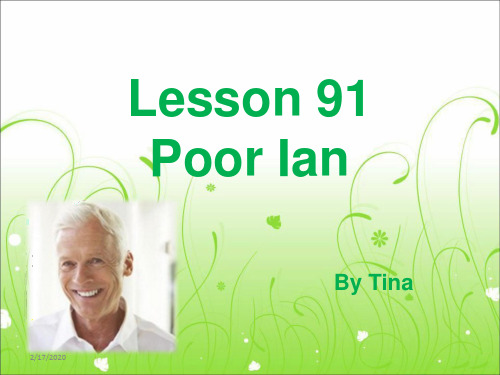
person和people用法:
person 强调的个体的人, 可以有复数形式 persons
people 通常是人的统称, 单复数形式相同
★ poor [puə] adj. 可怜的
① v. 想念,惦念 • I missed you.
我想你
② v. 错过;未做到 • He overslept and missed his train. • 他睡过了头,错过了他那班火车。
• miss doing sth. 未能 I missed buying the magazine. 我未能买到那本杂志。
(4)表示说话前发生过一次或多次的动作,现 在成为一种经验,一般译为汉语“过”,
常带有twice , ever, never,three times 等 时间状语。
I have been to Beijing twice. 我去过北京两次。
不规则动词的过去式以及过去分词 巧记规律
• AAA: put– put –put let—let –let • ABA: become—became—become • ABB: stand—stood—stood • ABC: eat— ate—eaten
v. 想念,思念 n. 邻居 adv. 还,仍旧 v. 搬家 n. 人 adj. 可怜的 n. 人们
Grammar
• 复习:现在完成时
★ 现在完成时的用法:(1)现在完成时表示过 去某时发生的行为对主语目前产生的影响。即
用过去发生的某个行为来说明现在的某种情况。
• 肯定句式: 主语+have (has)+p.p • 否定句式: 主语+have (has)+not +p.p • 一般疑问句: Have (Has)+主语+p.p? • 特殊疑问句:
新概念英语第1册语法及单词Lesson91~96

新概念英语第1册语法及单词Lesson91~96新概念英语第1册语法及单词Lesson91~92语法 Grammar in use一般将来时(1)一般将来时表示将来某一时刻的动作、状态以及准备。
该时态一般与表示将来意义的时间状语连用,如tomorrow(明天),this month(本月), the day after tomorrow(后天),next week (下周), in two days”time(两天之后), from now on(从现在起),in the future(将来)等。
(2)一般将来时的形式为 will/shall+ 动词原形。
will可用于全部人称,但shall仅表示单纯将来时用于第一人称I 和we,作为will的一种替代形式。
否认缩写: shan”t =shall not, won”t =will not:I shan”t leave tonight. I”ll leave tomorrow.今日夜里我不走。
我将于明天离开。
They won”t go to London this weekend.这个周末他们不去伦敦。
此外,will除了表示纯粹的将来时间外,还表示说话人的意图和意愿,而shall除了表示将来时间外同时还表示说话人的责任或决心。
(3)除了will/shall外,还可以用其他方法表示将来。
在口语中,be going to比 will/shall更为一般,用来表示说话人的意图或准备。
如: She is going to travel by air.她准备乘飞机旅行。
也可用来表示有迹象某事马上发生。
如:It”s going to rain.将要下雨了。
(4)可与将来时连用的时间短语有:今日:this morning / afternoon / evening今日上午/下午/晚上明天:tomorrow morning / afternoon / evening明天上午/下午/晚上后天:the day after tomorrow后天the night after next后天夜里其他:tonight今夜in the morning在上午in the afternoon 在下午in the evening在晚上词汇学习 Word study1.miss v.(1)惦念,惦念:We”ll miss you.我们会惦念你的。
新概念英语第一册学习手册【Lesson91、93、95】
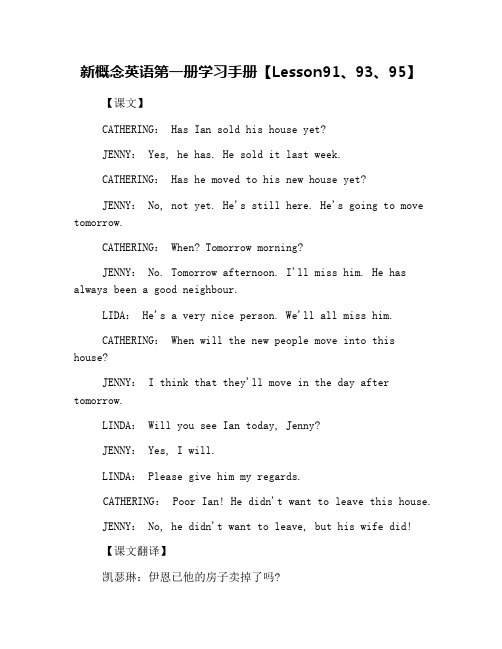
新概念英语第一册学习手册【Lesson91、93、95】【课文】CATHERING: Has Ian sold his house yet?JENNY: Yes, he has. He sold it last week.CATHERING: Has he moved to his new house yet?JENNY: No, not yet. He's still here. He's going to move tomorrow.CATHERING: When? Tomorrow morning?JENNY: No. Tomorrow afternoon. I'll miss him. He has always been a good neighbour.LIDA: He's a very nice person. We'll all miss him.CATHERING: When will the new people move into this house?JENNY: I think that they'll move in the day after tomorrow.LINDA: Will you see Ian today, Jenny?JENNY: Yes, I will.LINDA: Please give him my regards.CATHERING: Poor Ian! He didn't want to leave this house.JENNY: No, he didn't want to leave, but his wife did!【课文翻译】凯瑟琳:伊恩已他的房子卖掉了吗?詹尼:是的,卖掉了。
他上星期卖掉的。
凯瑟琳:他已经迁进新居了吗?詹尼:不,还没有。
他仍在这里。
他打算明天搬家。
新概念一册91到100课原文及译文
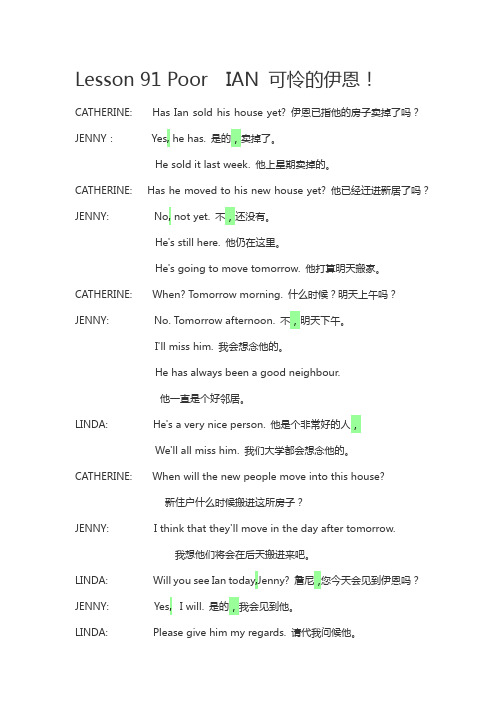
Lesson 91 Poor IAN 可怜的伊恩!CATHERINE: Has Ian sold his house yet? 伊恩已指他的房子卖掉了吗?JENNY:Yes, he has. 是的,卖掉了。
He sold it last week. 他上星期卖掉的。
CATHERINE: Has he moved to his new house yet? 他已经迁进新居了吗?JENNY: No, not yet. 不,还没有。
He's still here. 他仍在这里。
He's going to move tomorrow. 他打算明天搬家。
CATHERINE: When? Tomorrow morning. 什么时候?明天上午吗?JENNY: No. Tomorrow afternoon. 不,明天下午。
I'll miss him. 我会想念他的。
He has always been a good neighbour.他一直是个好邻居。
LINDA: He's a very nice person. 他是个非常好的人,We'll all miss him. 我们大学都会想念他的。
CATHERINE: When will the new people move into this house?新住户什么时候搬进这所房子?JENNY: I think that they'll move in the day after tomorrow.我想他们将会在后天搬进来吧。
LINDA: Will you see Ian today,Jenny? 詹尼,您今天会见到伊恩吗?JENNY: Yes,I will. 是的,我会见到他。
LINDA: Please give him my regards. 请代我问候他。
CATHERINE: Poor Ian! 可怜的伊恩!He didn't want to leave this house.他本不想离开这幢房子。
新概念英语第一册lesson91-92

表达人的人品很好可以用good或nice。
B: When will the new people move into this
house?
move to = move into 搬进
A:I think that they will move in the day after
tomorrow.
B: Will you see Ian today, Jenny? A: Yes, I will. give sb. sth. = give sth. to sb. 给某人某物=把某物给某人
going to working D. won’t work
3. He _____ very busy this week, he ______free next week.
A. will be; is B. is; is
C. will be; will be D. is;
will be
4. There _____a dolphin show in the zoo tomorrow evening.
I 者:
go on a trip with my friends tomorrow. 或
I
go on a trip with my friends tomorrow.
2)下个星期一你打算去干嘛? 我想去打篮球。
---What
next Monday?
---I
play basketball. 或者:
---What
you do next Monday? ---I
play basketball.
3)你妈妈这个周末去购物吗?是,她要去买一些水果。
---
your mother
新概念英语第一册Lesson_91
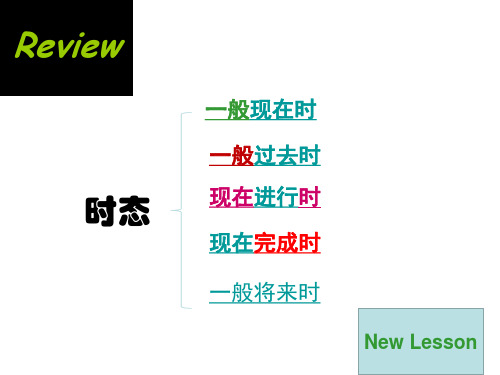
Yes , I do.
•
•
No , I don’t .
2.Li Lei and Meimei come from China
3.You like coffee.
There are many people in the swimming pool.
people n.人们
Listen to the tape,then answer these questions.
1. When did Ian sell his house?
2.When is Ian going to move?
not
• • • •
• •
二、用所给的动词适当形式填空。 doing (do)? He is ________ talking (talk) to his friend. 1. What is he ______ 2. What are you _______ the floor. doing (do)? I am _________(sweep) sweeping doing 3. What are they________(do)? Are they_________(play) in the garden ? playing
Review
一般现在时
一般过去时
时态
现在进行时 现在完成时 一般将来时
New Lesson
一般现在时
时态
1)表示没有时限的持久存在的动作或状态或现阶段反复发生的动 作或状态,常和副词 usually,often,always sometimes, regularly,near,occasionally,every year, every week 等连用。 2) 客观真理,客观存在,科学事实。 例如: The earth moves around the sun. 地球绕太阳转动。 Shanghai lies in the east of China. 上海位于中国东部。 3) 表示格言或警句。 例如:Pride goes before a fall. 骄者必败。 4) 现在时刻的状态、能力、性格、个性。例如: I don‘t want so much. 我不要那么多。 Ann writes good English but does not speak well. 安英语写得不错,讲的可不行。 Now I put the sugar in the cup. 把糖放入杯子。
新概念英语第一册L91~92
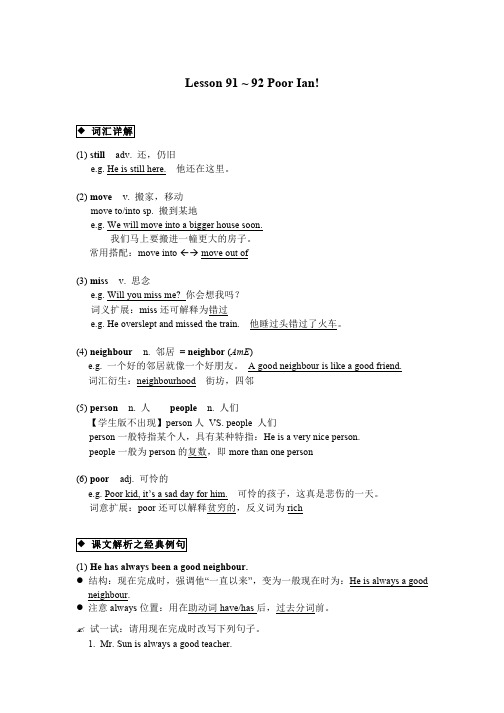
Lesson 91 ~ 92 Poor Ian!◆ 词汇详解(1) still adv. 还,仍旧e.g. He is still here. 他还在这里。
(2) move v. 搬家,移动move to/into sp. 搬到某地e.g. We will move into a bigger house soon.我们马上要搬进一幢更大的房子。
常用搭配:move into !" move out of(3) miss v. 思念e.g. Will you miss me? 你会想我吗?词义扩展:miss还可解释为错过e.g. He overslept and missed the train. 他睡过头错过了火车。
(4) neighbour n. 邻居= neighbor (AmE)e.g. 一个好的邻居就像一个好朋友。
A good neighbour is like a good friend.词汇衍生:neighbourhood 街坊,四邻(5) person n. 人people n. 人们【学生版不出现】person人VS. people 人们person一般特指某个人,具有某种特指:He is a very nice person.people一般为person的复数,即more than one person(6) poor adj. 可怜的e.g. Poor kid, it’s a sad day for him. 可怜的孩子,这真是悲伤的一天。
词意扩展:poor还可以解释贫穷的,反义词为rich◆ 课文解析之经典例句(1) He has always been a good neighbour.#结构:现在完成时,强调他“一直以来”,变为一般现在时为:He is always a good neighbour.#注意always位置:用在助动词have/has后,过去分词前。
- 1、下载文档前请自行甄别文档内容的完整性,平台不提供额外的编辑、内容补充、找答案等附加服务。
- 2、"仅部分预览"的文档,不可在线预览部分如存在完整性等问题,可反馈申请退款(可完整预览的文档不适用该条件!)。
- 3、如文档侵犯您的权益,请联系客服反馈,我们会尽快为您处理(人工客服工作时间:9:00-18:30)。
新概念英语第一册学习手册【Lesson91、93、95】【课文】CATHERING: Has Ian sold his house yet?JENNY: Yes, he has. He sold it last week.CATHERING: Has he moved to his new house yet?JENNY: No, not yet. He's still here. He's going to move tomorrow.CATHERING: When? Tomorrow morning?JENNY: No. Tomorrow afternoon. I'll miss him. He has always been a good neighbour.LIDA: He's a very nice person. We'll all miss him.CATHERING: When will the new people move into this house?JENNY: I think that they'll move in the day after tomorrow.LINDA: Will you see Ian today, Jenny?JENNY: Yes, I will.LINDA: Please give him my regards.CATHERING: Poor Ian! He didn't want to leave this house.JENNY: No, he didn't want to leave, but his wife did!【课文翻译】凯瑟琳:伊恩已他的房子卖掉了吗?詹尼:是的,卖掉了。
他上星期卖掉的。
凯瑟琳:他已经迁进新居了吗?詹尼:不,还没有。
他仍在这里。
他打算明天搬家。
凯瑟琳:什么时候?明天上午吗?詹尼:不,明天下午。
我会想念他的。
他一直是个好邻居。
琳达:他是个非常好的人,我们大家都会想念他的。
凯瑟琳:新住户什么时候搬进这所房子?詹尼:我想他们将会在后天搬进来吧。
琳达:詹尼,您今天会见到伊恩吗?詹尼:是的,我会见到他。
琳达:请代我问候他。
凯瑟琳:可怜的伊恩!他本不想离开这幢房子。
詹尼:是啊,他是不想离开,不过他妻子要离开。
【生词】still adv. 还,仍旧move v. 搬家miss v. 想念,思念neighbor n. 邻居person n. 人people n. 人们poor adj. 可怜的【知识点讲解】1. 本课当中我们终于接触到了第一个从句:I think thatthey'll move in the day after tomorrow.(我想他们后天搬进来。
)这是一个宾语从句,大家在这里只要有一个简单的印象就好,不用太纠结。
这句话中I think that... 是主句,意思是我想……;they'll move in the day after tomorrow. 他们后天搬进来,这后半句是一个完整的句子,就是从句了。
2. 课文最后两句对话:CATHERING: Poor Ian! He didn't want to leave this house.JENNY: No, he didn't want to leave, but his wife did!请注意Jenny的回答"No, he didn't..."是对前面Cathering观点的肯定。
这里使用"No"开头,和我们中文的习惯不太一样。
大家能够理解为Jenny在顺着Cathering的话说,但翻译成中文时就要改成汉语习惯,译为:是啊,他不想离开。
3. Poor Ian,意思是可怜的伊恩。
英文中常用Poor XX来表达同情。
如果朋友遭遇不幸,你能够说"You poor little thing." 你这可怜的小东西!——来安慰对方。
Lesson93【课文】Nigel is our new next-door neighbour. He's a pilot.He was in the R.A.F.He will fly to New York next month.The month after next he'll fly to Tokyo.At the moment, he's in Madrid. He flew to Spain a week ago.He'll return to London the week after next.He's only forty-one years old, and he has already beento nearly every country in the world.Nigel is a very lucky man. But his wife isn't very lucky. She usually stays at home!【课文翻译】奈杰尔是我们新搬来的隔壁邻居。
他是个飞行员。
他曾在皇家空军任职。
下个月他将飞往纽约。
再下个月他将飞往东京。
现在他在马德里。
他是一星期以前飞到西班牙的。
再下个星期他将返回伦敦。
他只有41岁,但他却去过世界上几乎每一个国家。
奈杰尔是个很幸运的人。
但他的妻子运气不很好。
她总是呆在家里!【生词】pilot n. 飞行员return v. 返回New York n. 纽约Tokyo n. 东京Madrid n. 马德里fly (flew, flown) v. 飞行【知识点讲解】1. next-door neighbour 意思是隔壁邻居。
2. R.A.F 是 the Royal Air Force 英国皇家空军的简写;3. next month, 下个月;the month after next,下下个月;the week after next,下下周。
Lesson95【课文】GEORGE: Two return tickets to London, please. What time will the next train leave?ATTENDANT: At nineteen minutes past eight.GEORGE: Which platform?ATTENDANT: Platform Two. Over the bridge.KEN: What time will the next train leave?GEORGE: At eight nineteen.KEN: We've got plenty of time.GEORGE: It's only three minutes to eight.KEN: Let's go and have a drink. There's a bar next door to the station.GEORGE: We had better go back to the station now, Ken.PORTER: Tickets, please.GEORGE: We want to catch the eight nineteen to London. PORTER: You've just missed it!GEORGE: What! It's only eight fifteen.PORTER: I'm sorry, sir. That clock's ten minutes slow. GEORGE: When's the next train?PORTER: In five hours' time!【课文翻译】乔治:买两张到伦敦的往返票。
下一班火车什么时候开?服务员:8点19分。
乔治:在哪个站台?服务员:2号站台。
过天桥。
肯:下一班火车什么时候开?乔治:8点19分。
肯:我们时间还很宽裕。
乔治:现在才7点57分。
肯:让我们去喝点东西吧,车站旁有一个酒吧。
乔治:肯,我们现在回车站去。
收票员:请把车票拿出来。
乔治:我们要乘8点19分的车去伦敦。
收票员:你们刚好错过了那班车。
乔治:什么!现在只有8点15分。
收票员:对不起,先生,那个钟慢了10分钟。
乔治:下一班车是什么时候?收票员:5个小时以后!【生词】return n. 往返train n. 火车platform n. 站台plenty n. 大量bar n. 酒吧station n. 车站,火车站porter n. 收票员catch (caught, caught) v. 赶上miss v. 错过【知识点讲解】1. 这个课我们来学习表达准确时间的说法。
首先时、分、秒的说法分别是:hour, minute, second;表达整点的说法很简单,能够直接说数字,或数字加o'clock。
比如8点钟,可说It's eight. 或者It's eight o'clock.表示更精确到分钟的方法有两种。
比如8点20分,能够直接按顺序说出数字:It's eight twenty;也能够先说分秒,再说整点:It's twenty past eight.半点和15分钟有特别的表达方式,比如8点半,能够说成eight thrity,也能够说成half past eight;一刻钟也可说成a quarter,比如8点15分可说成eight fifteen,或a quarter past eight(注意不能说成eight a quarter);或者差一刻9点,可表达为eight fourty five,也能够说成a quarter to nine.2. return ticket,往返票;在美式英语中讲 round ticket.3. in five hours' time 意思是5小时之后。
